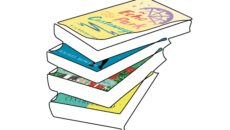As our children enter the grade-school years, they’re ready to think about their adoption story, but want to do so at their own pace. Exploring this aspect of their lives is a journey with many stops and starts. They may ponder it for a bit, turn their attention elsewhere, then want to know all the details of their past. So how can we help our kids explore adoption in ways that support their budding need for knowledge—and independence?
Private Time
Many parents find it useful to compile an adoption bookshelf, especially when a child begins reading on her own. When my daughter was seven, for instance, she loved to read A Mother for Choco, the story of a baby bird who finds a bear to be his mother. I often found her poring over this or one of the other adoption books we had read together when she was four or five.
Six- to eight-year-olds read adoption books differently than they did when they were younger. By this age, children know the facts of their adoption. Many are ready to explore their feelings about it. Books on adoption provide the chance to “try on” feelings and see which ones fit. Giving a name to a feeling is enormously helpful. When children identify their feelings, and, by reading about them, understand that they are normal, they gain a sense of comfort and relief.
Some parents worry that such books raise questions that might not occur to their children. They wonder, “Why should my child read a sad adoption book, if she is not sad?” But most children are confused, sad, or angry (or all of these things) at some point in their lives. Books do not “create” feelings in a child, but help to identify them. They help the child see that these feelings are OK.
Once a child knows what she is feeling, she can come to us. No matter how independent she wants to be, this is when she needs usto sit with her, to help her bear the upset, and to offer our reassurance that we understand.
If adoption is a journey, then exploring adoption is a journey, too. Our grade-schoolers want to walk some of this way on their own, but will continue to glance over their shoulders to see if were still there. By giving them permission to explore at their own pacethrough the wonderful world of bookswe are sharing the road, just a few steps behind.



